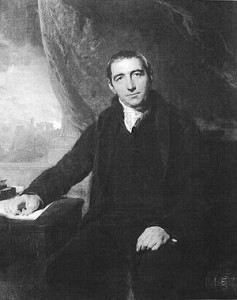Stephanus pagination
Taylor, Thomas
 Thomas Taylor (1758-1835) was the first to publish, in English, the complete works of Plato and Aristotle, in 1804. His publication was the completion of valuable work begun by the unfortunate Floyer Sydenham. Taylor is regarded by some as having had a valuable insight into the mind of Plato, which made his translations superior to many others. In 2009, a five-volume, first-edition set went on sale for $22,000.
Thomas Taylor (1758-1835) was the first to publish, in English, the complete works of Plato and Aristotle, in 1804. His publication was the completion of valuable work begun by the unfortunate Floyer Sydenham. Taylor is regarded by some as having had a valuable insight into the mind of Plato, which made his translations superior to many others. In 2009, a five-volume, first-edition set went on sale for $22,000.
Although Taylor’s work was generally well received, a subsequent translation by Rev. Henry Davis scathingly referred to Taylor’s work as “uncouth, obscure, unEnglish and often extremely erroneous.” Nevertheless, Madame Blavatsky and other theosophists were very happy with Taylor’s translation.
A reprint [644] of Taylor’s 1810 translation of Timaeus and Critias has been made available by Kessinger Publishing. Unfortunately, it does not include the Stephanus pagination references, which makes navigation a little more difficult. However, an extensive website dealing with the work of Gerald Massey(b) includes Taylor’s translation of Plato’s Critias and Timaeus with pagination.
>In Taylor’s complete edition of Plato’s works from 1804, there is also a preface by him to the dialogue Critias , which is of some interest from an Atlantological point of view. Thorwald C. Franke notes [1255.347], that in it “Taylor shows understanding that Atlantis finds no credence, since the 9,000 years would contradict the commonly accepted age of the world. Nevertheless, Plato’s Atlantis tradition is as good history as that of others ancient historians too, says Taylor, because it would be Plato’sTotally contrary to the ethos of truth to deceive humanity with such a story. Taylor rejects localizations of Atlantis in America and Africa since the island of Atlantis is said to have sunk into the sea. “(a)<
(a) Thomas Taylor – Atlantisforschung.de (atlantisforschung-de.translate.goog)
(b) Introduction to the Works of Massey (archive.org) (see introduction Pt.5)
Estienne II, Henri
Henri Estienne II (1528 or 1531-1598) was the most notable of a Parisian family of scholar-printers who later moved to Geneva. In 1578 he published a four-volume edition of the works of Plato in Greek and Latin. The Latin translation was a commission from Jean de Serres.
Estienne’s name was Latinised as Henricus Stephanus and as such has been immortalised in the term ‘Stephanus pagination’, which refers to the system of reference and organisation still used in modern versions of Plato based on the layout of his 1578 edition.
He was also responsible in 1555 for the introduction of the chapter and verse divisions of the Latin Bible, which are also still in use today.
A comparable referencing system for the works of Aristotle is known as ‘Bekker numbers’, named after the classical philologist August Immanuel Bekker (1785-1871).
